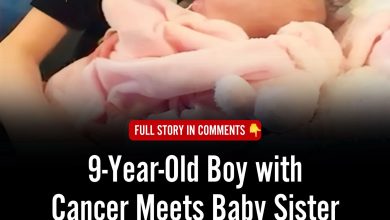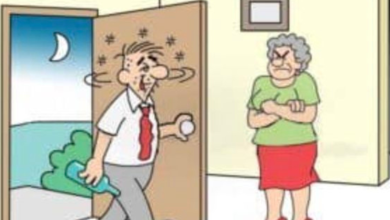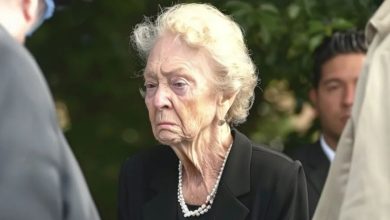I had imagined the day I’d bring my babies home for the first time a thousand different ways. I pictured Derek standing at the hospital entrance, flowers in one hand and car seat in the other, grinning nervously but excitedly as we navigated the fragile little bundles into the backseat. I imagined the drive home, his hand reaching across the console to squeeze mine, the moment we’d walk through our front door and set our daughters—our daughters—into their crib for the first time.
But that’s not what happened.

Instead, on the morning I was discharged from the hospital, I sat on the edge of the hospital bed in a quiet room that smelled faintly of antiseptic and baby powder, swaddling my twin girls, Ella and Sophie, while waiting for Derek. He was running late, which wasn’t like him—at least not the man I married.
Then the call came.
“Hey,” Derek said quickly, not even offering a “hello.” “I can’t come. My mom’s sick—real sick. I’ve gotta take her to the hospital. I’m sorry.”
His tone was clipped, distracted. Like I was interrupting something more important.
I felt a strange chill run down my spine. “Are you serious? I’m getting discharged. I—I can’t carry the girls and the bags—”
“I’ll explain later,” he interrupted. “I gotta go.”
And then he hung up.

I sat there in stunned silence. A nurse gently touched my shoulder, asking if I was okay. I nodded mechanically and arranged for a taxi. Inside, the driver tried to make small talk, but I could barely focus. Something was wrong. I didn’t know what it was, not yet—but I felt it in the pit of my stomach.
When the taxi pulled up to our house—our house—I immediately saw the suitcases.
Three of them, along with a diaper bag and a torn grocery sack, all haphazardly piled on the front step like forgotten luggage at a bus station. My breath caught. I stepped out of the car in slow motion, cradling the twins, my mind refusing to process what my eyes were showing me.
“Derek?” I called out as I struggled up the steps.
Silence.
I juggled Ella and Sophie and managed to slide my house key into the lock.
It didn’t turn.
Confused, I tried again. Then again, my hand trembling now. But it wouldn’t fit. Wouldn’t budge.
The locks had been changed.
That’s when I saw it.
A piece of lined notebook paper, torn at the edges and taped clumsily to one of the duffel bags. I stared at it for several long seconds before I reached for it.
The handwriting was his—hurried and cold.
Rebecca,
I can’t do this anymore. I can’t handle the stress, the responsibility, the everything. It’s too much for me. I’ve moved out.
Take care of yourself and the girls.
I’m sorry.
– Derek
My knees buckled. I sank to the step, the paper fluttering in my lap as I held my newborn daughters close, rocking gently without even realizing it. The late autumn wind bit at my cheeks. I couldn’t feel it. I couldn’t feel anything except the hollow ache cracking open inside me.

People say when your heart breaks, you feel it. I always thought that was a metaphor.
It’s not.
Across the street, curtains shifted. Windows opened just a crack. Neighbors peeked out, their expressions somewhere between confusion and pity. No one came out. No one asked if I was okay. They just watched.
And I sat there, a woman turned out of her own life, clutching two tiny lives who had no idea what had just happened.
I don’t remember finding my phone. I don’t remember dialing. But suddenly I heard Leah’s voice on the other end.
“Becca? What’s wrong?”
I couldn’t speak. I just sobbed.
“I’m coming right now. Stay where you are. Don’t move,” she said, her voice sharp, full of protective urgency.
Fifteen minutes later, her little car screeched into the driveway, and she was out before the engine stopped. She knelt beside me, wrapped her arms around me and the girls, and whispered, “It’s okay. You’re not alone. I’ve got you.”
We loaded everything into her car—bags, babies, the broken pieces of my heart—and drove to her apartment. It was small, barely enough space for her and her fiancé, but she didn’t hesitate for a second. That night, she gave me her bedroom and set up two laundry baskets as makeshift bassinets for the twins.
I lay there on her bed, numb, replaying everything in my mind—the ultrasounds, the nursery we painted together, the baby names we debated late at night, the way Derek used to kiss my belly and whisper goodnight to “his girls.” Where had that man gone? How could he leave this?
Sleep never came.
The Days That Followed
Over the next few days, I pieced together the truth.
Leah helped me access our joint bank account. It was nearly empty. Withdrawals—small at first, then growing bolder—had been made over the past month. He’d been planning this. While I was lying in a hospital bed bringing our daughters into the world, he was preparing to vanish from it.

One of Leah’s friends, a real estate agent, helped us find the address of a new apartment Derek had rented—across town. He didn’t just leave; he erased himself from our lives with clinical precision.
I tried calling him.
No answer.
Texted. Emailed.
Nothing.
It was like he’d never existed. The man who once told me I was his whole world now couldn’t be bothered to check in on the daughters he helped bring into it.
I sank into grief. But I didn’t stay there long.
Because I had two little girls who needed me.
So, I got up.
I started small. I applied for government assistance, asked Leah to help watch the girls while I applied for part-time work, and got hired at a bakery that paid just enough to keep diapers stocked and formula on the shelf.
It wasn’t glamorous. I often came home with flour in my hair and aching feet, but I came home to Ella and Sophie. Their coos, their tiny fingers curling around mine, their warm bodies snuggled against my chest in the quiet moments—they reminded me that love hadn’t left my life. It had just changed shape.
I also started therapy.

At first, it was painful. Saying the words out loud—He left me. He left our babies. He changed the locks while I was still in the hospital.—felt like reopening a wound that never had a chance to scab.
But with time, I started to let go of the guilt. Derek’s cowardice wasn’t my burden to carry. His abandonment wasn’t a reflection of my worth—it was of his.
Eventually, I filed for divorce.
He didn’t fight it. Didn’t show up. I was granted full custody. The judge called it “an obvious case of abandonment.” Those were the legal words.
But to me, it was something deeper.
It was closure.
A New Kind of Family
On the twins’ first birthday, we hosted a small party at Leah’s place. Streamers and mismatched balloons filled the room. There was cake everywhere and frosting in hair and laughter echoing off the walls. It was chaotic. Beautiful. Real.

As I looked around at the faces of friends who had stepped up when family failed, at Leah holding Sophie while her fiancé danced with Ella, I realized something:
We were whole.
Not in the way I once imagined—but in a way I had built, piece by hard-won piece.
There are still nights when I ache. When the loneliness creeps in. When I wonder if I’ll ever love again—or be loved the way I once believed I would be.
But then I look at Ella and Sophie. I see their resilience, their joy, their innocence untouched by betrayal. And I know I’m doing something right.
One night, after I had read them their bedtime story and kissed their foreheads, I whispered the same promise I’d been whispering for months:
“We’re going to be okay. Better than okay.”
And I finally, finally believed it.

This work is inspired by real events and people, but it has been fictionalized for creative purposes. Names, characters, and details have been changed to protect privacy and enhance the narrative. Any resemblance to actual persons, living or dead, or actual events is purely coincidental and not intended by the author.







